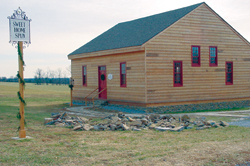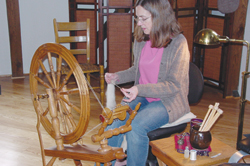



Going Dutch
Early
American Thanksgiving
keeps age-old traditions alive
The
Meetinghouse to host
holiday re-enactment event
By
Helen E. McKinney
Contributing Writer
PLEASUREVILLE, Ky. (November 2008) – Since childhood,
Ellen May has been interested in the every day history of how people
lived and worked. What has especially sparked her interest is the fact
that her great grandmother and great-great grandmother were spinners
and weavers.
 |
|
Photo
provided Meetinghouse
once center of Low |
A process once common among all households, spinning and
weaving has become somewhat of a lost art. May often listened to stories
from family members about their life experiences, most of them having
been born in the late 1800s, their childhoods a stark contrast to her
1950s upbringing.
These differences fascinated her and “sparked a lifelong interest.
I have learned what little I know through reading and personal experimentation.”
She has volunteered to spin at such historic locations as Locust Grove
and the Farnsley-Mooreman House, both located in Louisville, Ky. May,
an Oldham County resident, will demonstrate the technique of dying wool
over an open fire at the Low Dutch Meetinghouse in Henry County. “An
Early American Thanksgiving” is planned from 10 a.m. to 4 p.m.
Saturday, Nov. 22 at the Low Dutch Meetinghouse, 6805 Castle Hwy. in
Pleasureville. A variety of re-enactors will demonstrate the early American
lifestyle and such additional heritage skills as wool spinning, frontier
cooking, weapons, flintknapping and broommaking.
Visitors may also tour the Meetinghouse, said owner JoAnn Adams. The
building is reconstructed from the original timbers of the Six Mile
Meetinghouse (circa 1824), she said. It was used by Low Dutch settlers
who came to the area from Holland.
“We want to share the history and culture of the Dutch Settlers
with people of the community,” said Adams. She labeled the settlers
a communal group who worked, worshiped and played together.
“The Meetinghouse was the center of all their activities. We want
to continue the tradition of sharing with the community.”
For May, the process of dying yarns is a hobby, not a business. “There’s
a great deal of history wrapped up in the use of various plants, animals
and minerals for dyes. I love sharing with others about how our ancestors
enjoyed colors just as we do, and how they used what grew around them
in nature to achieve this goal,” said May.
All dyes were derived from natural sources prior to 1856, when the first
aniline dye was discovered, said May. Fibers must first be prepared
to take the dye through the use of a mordant. This involves simmering
the yarn or fiber in a metallic solution, usually aluminum, iron, copper
or tin, she said.
 |
|
Photo
provided JoAnn Adams works on a spinning wheel. |
“Early dyers used natural resources for mordant such
as iron or copper posts and household alum,” said May. She will
be demonstrating what she called a straight-forward “boil-it-up”
method with a pre-mordanted yarn at the Early American Thanksgiving
event and will have examples of other dyes on hand that she has produced
over the years.
Vendors will be selling a variety of products that day including wool,
yarn and knitted items, painted gourds, soap, paintings, stained glass,
cider, apples and honey.
Toni Downs will be selling her honey and said it “is unique in
that it is drawn from local floral sources and the flavor doesn’t
quite match anyone else’s due to that fact-nor does it match itself
from year to year.”
When Downs began eating locally made honey for her allergies, “Beekeeping
became a natural extension for me to produce it for myself,” she
said. She attended beekeeper meetings and followed a couple of beekeepers
around while they worked their hives for hands-on experience. She then
attended a beginning beekeeping class taught by Dr. Tom Webster of the
Kentucky State University extension program.
Downs has five hives and hopes to increase that number. “It is
important for a beekeeper to have healthy hives bursting with bees so
they can bring in lots of nectar and process it into honey,” said
Downs. His honey and honey products are available for sale in the Meetinghouse.
Adams will be selling her limited edition handspun angels, always a
popular gift item. Every month she sponsors a “Second Sunday Session”
in which the Meetinghouse is open to spinners and knitters the second
Sunday of each month. Mini workshops are held on those days from 2 p.m.
to 6 p.m.
• For more information, contact JoAnn Adams at (502) 878-4814 or visit www.sweethomespun.com.